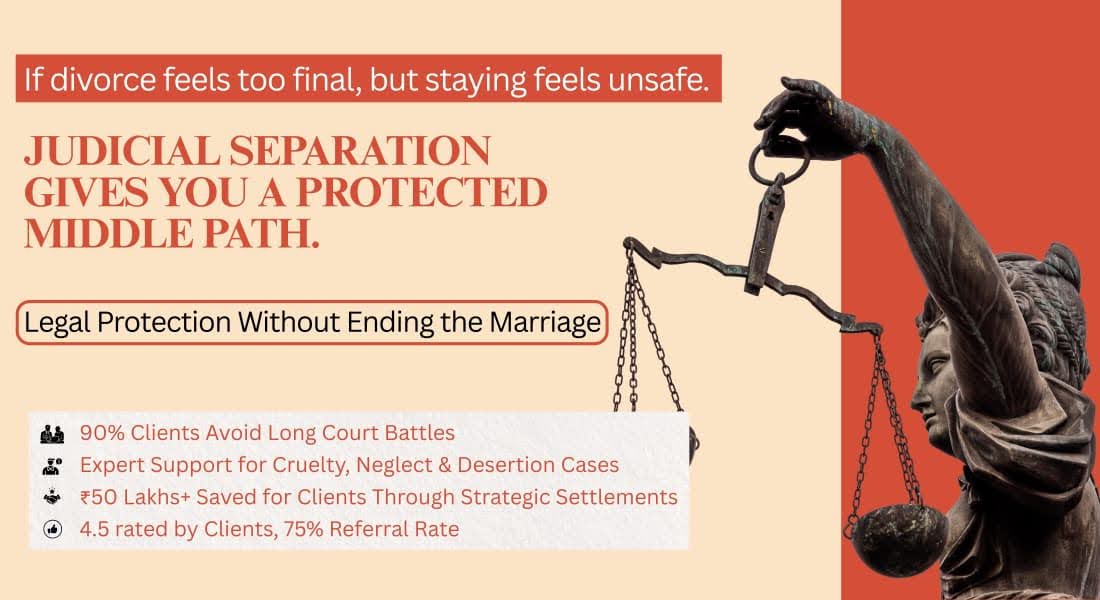
What do couples who are suffering from temperamental differences, lack of communication, compatibility issues, professional intervention etc; ideally opt for?
What are the options these couples have?
Divorce?
No, We beg to differ and throw light upon this ongoing successful option which has recently hit the trend, commonly known as “Judicial Separation.”
What is Judicial Separation?
Judicial Separation is a legal remedy that allows couples to live separately without dissolving the marriage. It gives you space, clarity, and emotional distance without the finality of divorce.
For many individuals, especially in complex relationships, this step offers safety, stability, and structure without immediately choosing divorce.
If you’re unsure whether to file for divorce or want time apart for personal, emotional, or legal reasons, Judicial Separation can be the right path; and Easy Divorces helps you understand every option clearly, whether you’re searching for a divorce lawyer nearby, the best divorce advocate near me, or a reliable divorce lawyer in Mumbai.

Understanding Judicial Separation: When Is It Needed?
Judicial Separation is often misunderstood. It is not a casual separation or temporary breakup; it is a court-recognised legal status that gives both spouses the right to:
- Live apart
- Stop cohabitation
- Protect financial and personal rights
- Avoid certain marital obligations
- Maintain legal recognition of marriage
This allows individuals to create a safe and structured environment while deciding the future of the marriage.
A trusted family lawyer in Mumbai or a matrimonial lawyer in Mumbai can guide you through this with clarity.
If you’re questioning your situation, contact us; this clarity is exactly what our team provides as your trusted family lawyer in Mumbai or matrimonial lawyer in Mumbai who listens without judgment.

When should you consider filing for Judicial Separation?
Judicial separation is meant for situations where the marriage is strained, unsafe, or emotionally draining; but you’re not ready or able to take the step toward divorce.
1. You need time and space before deciding on Divorce
Many couples need emotional clarity before taking a permanent legal step. Judicial separation allows you to:
- Live separately
- Reduce everyday conflicts
- Reflect on the marriage
- Explore counselling or mediation
It gives breathing space without breaking the marital bond.
2. You are facing abuse, neglect, or mental cruelty
If your spouse is abusive, physically, emotionally, mentally, or financially; judicial separation helps you distance yourself immediately, while still leaving room for a possible settlement or reconciliation later.
This is often chosen by people who are unsure about divorce but need urgent safety.
If this is your situation, our experienced divorce lawyer in Andheri West and advocate in Andheri West provide confidential and structured guidance.
3. Your spouse has deserted you or withdrawn marital obligations
If your partner has abandoned you physically, emotionally, or financially, judicial separation helps you secure your rights and create legal clarity without dissolving the marriage.
4. You are facing frequent conflicts, but Divorce feels too final
Some couples experience constant emotional strain, arguments, and incompatibility — but culturally, emotionally, or personally, divorce may feel “too big” a step.
Judicial separation becomes a legal middle ground that provides stability while maintaining the marriage.
5. You need legal protection without ending the marriage
Judicial separation provides rights related to:
- child custody
- maintenance
- finances
- personal safety
- separation of responsibilities
It acts as a protective barrier while you evaluate your long-term marital decisions.
Cases like these require sensitive handling. Our team’s experience with divorce consulting in Mumbai ensures you receive the clarity and support you need.
Why Easy Divorces is the most trusted choice for Judicial Separation?
1. 50% faster resolution than traditional legal routes
Most legal separation matters drag on for years. Our structured legal strategy, clear documentation, and settlement-first approach reduce unnecessary delays, helping clients reach clarity and stability faster.
2. Average case closure time: 3–6 months (Mutual Consent)
While every case is unique, our streamlined process ensures that mutual separation matters are resolved in as little as 3–6 months. This is especially valuable for couples who want certainty without courtroom stress.
3. Helped clients save ₹50 Lakhs+ in legal costs
Through structured negotiations, efficient settlements, and avoiding unnecessary litigation, we have helped clients collectively save ₹50,00,000+ in legal expenses.
4. 90% of clients avoided lengthy court battles
5. Rated 4.5/5 by past clients
Our reviews come from real individuals who went through difficult transitions and found clarity, safety, and stability with our support. A 4.5-star rating reflects reliability, transparency, and trust; the qualities every client deserves when choosing a divorce lawyer in Andheri West or an advocate in Andheri West.
6. 75% of our clients come through referrals
Frequently Asked Questions (FAQ)
Is judicial separation the same as divorce?
No. Judicial separation allows you to live apart, but the marriage stays legally intact.
How long does judicial separation last?
There is no fixed timeline. Couples may stay separated for months or years before deciding their next step.
Can judicial separation help if my spouse is abusive?
Yes. It allows immediate distance and legal protection without ending the marriage outright.
Do I need strong evidence to file?
Grounds such as cruelty, desertion, abuse, or neglect can be supported with documents, testimony, or communication records. We guide you through what is required.
Can I later convert judicial separation into divorce?
Yes. Many couples who begin with separation later transition to divorce if reconciliation doesn’t happen.
Do both partners need to agree?
Not necessarily. You can file even if your spouse doesn’t consent.

